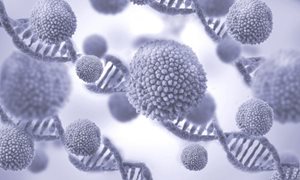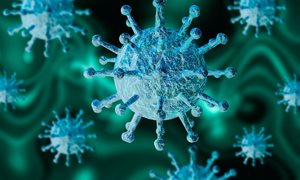
Does an infection affect the immunization of subsequent generations? It does, according to research now published in Nature Immunology. Mouse fathers who had overcome an infection with fungi passed on their improved protection to their offspring across several generations. A broader improved immune response was being passed on to the descendants as well.
Scientific studies show that environmental influences can pass on to the next generation by means of epigenetic changes. Epigenetic changes modify the activation of certain genes, but not the genetic code itself. It has been shown in plants and invertebrates that epigenetics changes – such as resistance to infections – can be passed on to next generations. A research team from the Radboud University Medical Center Nijmegen (Netherlands), the University of Bonn, Saarland University (both Germany), the University of Lausanne (Switzerland) as well as the National and Kapodistrian University of Athens (Greece) has now investigated whether effects on the innate immune system (trained immunity) in mammals are also passed on to the next generations.
Infection with fungi trains the immune system of mice
The researchers infected male mice with Candida albicans (fungi). After recovering from the infection, the animals were mated with completely healthy females. The researchers compared the resulting offspring with offspring from pairs of mice that were not infected with Candida. In order to investigate the status of the immune system experimentally, the team infected the males of the subsequent generation of mice with coliform bacteria. "The offspring of the male mice previously exposed to Candida were significantly better protected from a subsequent E. coli infection than the progeny of the uninfected male mice," reports Prof. Dr. Mihai G. Netea of the Radboud Center for Infectious Diseases. This effect was still evident in the next generation.
Epigenetically rewired
How does this transmission of immunization to subsequent generations work? The team examined typical immune cells such as monocytes or neutrophils. No differences were detectable between the offspring of Candida-infected male mice and the non-infected control group. However, in the offspring of the previously infected mouse fathers, the MHC class II complex was upregulated, which activates parts of the immune system. In addition, the activity of genes involved in inflammation was also found to be upregulated in the offspring of Candida-infected male mice. In the offspring of fathers previously infected with C. albicans, it was found that genes associated with inflammation were easier to read in monocyte progenitors than in sons of uninfected fathers. "This shows that monocyte precursors are epigenetically rewired if the fathers have previously undergone infection with C. albicans," Prof. Dr. Andreas Schlitzer of the LIMES Institute at the University of Bonn summarizes.
Shift in gene activity is detectable in sperm
How does the transmission of this information to the next generation take place? In cooperation with Saarland University, the researchers investigated the gene activity of the sperm of mouse fathers infected with Candida. They analyzed the extent to which methyl groups blocked access to genes in order to de-activate them. "A shift in gene markers was evident here," says Prof. Dr. Jörn Walter of Saarland University. Offspring of Candida-infected male mice showed fewer gene blockages in gene regions important for inflammatory processes and monocyte maturation. How the information about the sperm markings reaches the bone marrow, the birthplace of many immune cells, still needs to be explored in further studies.
In mice and men?
"The study is the first to show in mammals that adaptations to infectious diseases are also passed on to the offspring," Netea says. In contrast to the classical theory of evolution, which assumes slow adaptation through changes in the genetic code, this involves very rapid changes via the epigenetic regulation of gene activities, irrespective of the genetic code. The researchers do not yet know whether the findings obtained in mice can also be transferred to humans. "But we are assuming that this is the case," Schlitzer says. "The immune system mechanisms and cells involved are very similar in mice and humans."
-
Publication in Nature Immunology: Transmission of trained immunity and heterologous resistance to infections across generations - Natalie Katzmarski, Jorge Domínguez-Andrés, Branko Cirovic, Georgios Renieris, Eleonora Ciarlo, Didier Le Roy, Konstantin Lepikhov, Kathrin Kattler, Gilles Gasparoni, Kristian Händler, Heidi Theis, Marc Beyer, Jos W. M. van der Meer, Leo A. B. Joosten, Jörn Walter, Joachim L. Schultze, Thierry Roger, Evangelos J. Giamarellos-Bourboulis, Andreas Schlitzer, Mihai G. Netea: DOI: 10.1038/s41590-021-01052-7
-
Want to know more about these subjects? Click on the buttons below for more news.
More information
Pieter Lomans

persvoorlichter
Related news items

Micro-Cosmos helps patient unwind during hospitalization
10 February 2022 Nijmegen-based Micro-Cosmos is a start-up that makes retractable hoods to speed up the recovery of hospitalized patients. read more
LUMO Labs and Oost NL invest in Aiosyn Investment accelerates development of artificial intelligence platform to improve diagnostics
7 February 2022 Aiosyn, a spin-off from Radboudumc, has received an investment from LUMO Labs. Oost NL is a co-investor. read more
Veni for 8 researchers Radboudumc and Radboud University
16 December 2021 NWO has awarded 89 promising young scientists Veni funding of up to 280,000 euros. Eight of them are from Radboudumc and Radboud University. They can develop their own research ideas over a period of three years. read more
T-Guard can reset immune system
1 December 2021 For 20 years, the Nijmegen based Radboudumc spin-off company Xenikos has been working on a drug that can reset the immune system. This reset will save lives of seriously ill patients. Now, after years of hard work, the moment of truth has arrived for T-guard. read more
Dutch-Nordic Alliance for Precision Cancer Medicine launched
26 November 2021 The Nordic countries (Denmark, Sweden, Norway, and Finland) are together setting up national clinical precision cancer trials modelled on the very successful DRUP trial in the Netherlands. read more
